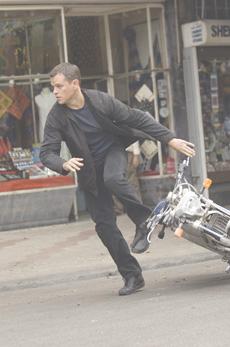 Courtesy of Universal Pictures
Courtesy of Universal PicturesAn action movie aims to create tense, tightly packed action in under three hours. When Paul Greengrass directs, the action isn’t created so much as it’s caught on camera.
After the second film, there wasn’t much of a story left to tell, so “The Bourne Ultimatum” delves into Jason Bourne’s history. The Bourne trilogy chops through its final chapter, yet, surprisingly, carries the story off well.
In fact, “Ultimatum” may be the best threequel of the summer. After grossing more than $70 million in its first weekend, Matt Damon’s third action foray captured the biggest August opening ever.
As one of the only series that continues to get better, Greengrass had his hands full with this, the vaguest Bourne.
Through two car chases, three police chases and four languages, Damon’s exhaustion becomes Bourne’s.
“Even if I tried to have the methodical sleep-deprivation look in the film, it wouldn’t be as authentic as me being up all night with a crying baby at home,” he told Entertainment Weekly.
In each chase the director tracks Bourne on the fly, making the audience feel as though they are a part of the action, chasing the enemy side-by-side with Bourne.
Forced into smaller spaces this time around, Bourne manages to escape with minor scrapes as he handily defeats his enemies.
Picking up almost exactly where the second movie left off, Greengrass tracks Bourne across the world, from Russia to New York to Europe and back. He uses grainy, realistic footage which forces Bourne on the viewer and seems to put you in the driver’s seat.
While Bourne struggles to find direction, smeared memories attack him, forcing him to shut off his brain in order to survive. He is chased around the world by CIA section chief Noah Vosen (David Strathairn) who believes him to be a monster.
Vosen wants to eradicate the threat that is Jason Bourne and will stop at nothing to reach his goal. As Bourne gets closer to his own beginnings, his only ally is Pamela Landy (Joan Allen) from the previous movie.
Strathairn as Vosen is evil incarnate and viewers root for Bourne to triumph.
What Bourne has that sets him apart from his enemies is humanism, an inherent faith in humanity that forces him to see the good in people. People require this humanism of their heroes today for mere proof that somebody somewhere believes in them.
After five years, “The Bourne Ultimatum” wraps up the trilogy nicely; a series like this could never have a neat ending, but Greengrass and Damon answer the hanging questions.
With no fourth film in the works, Bourne will have to be content with the mere knowledge of his past and so will viewers.






